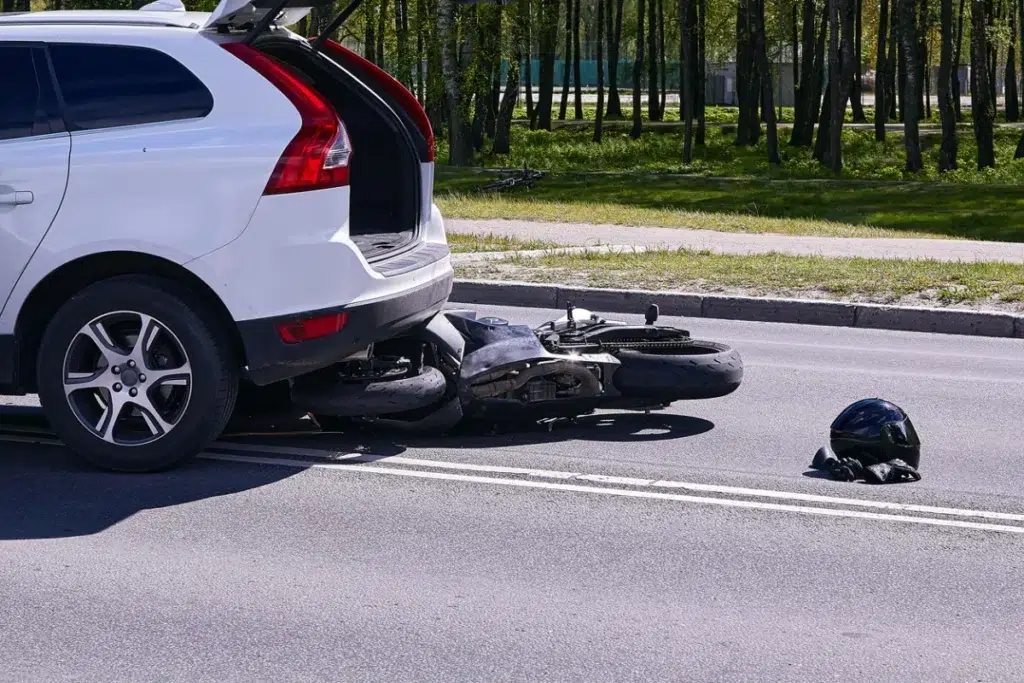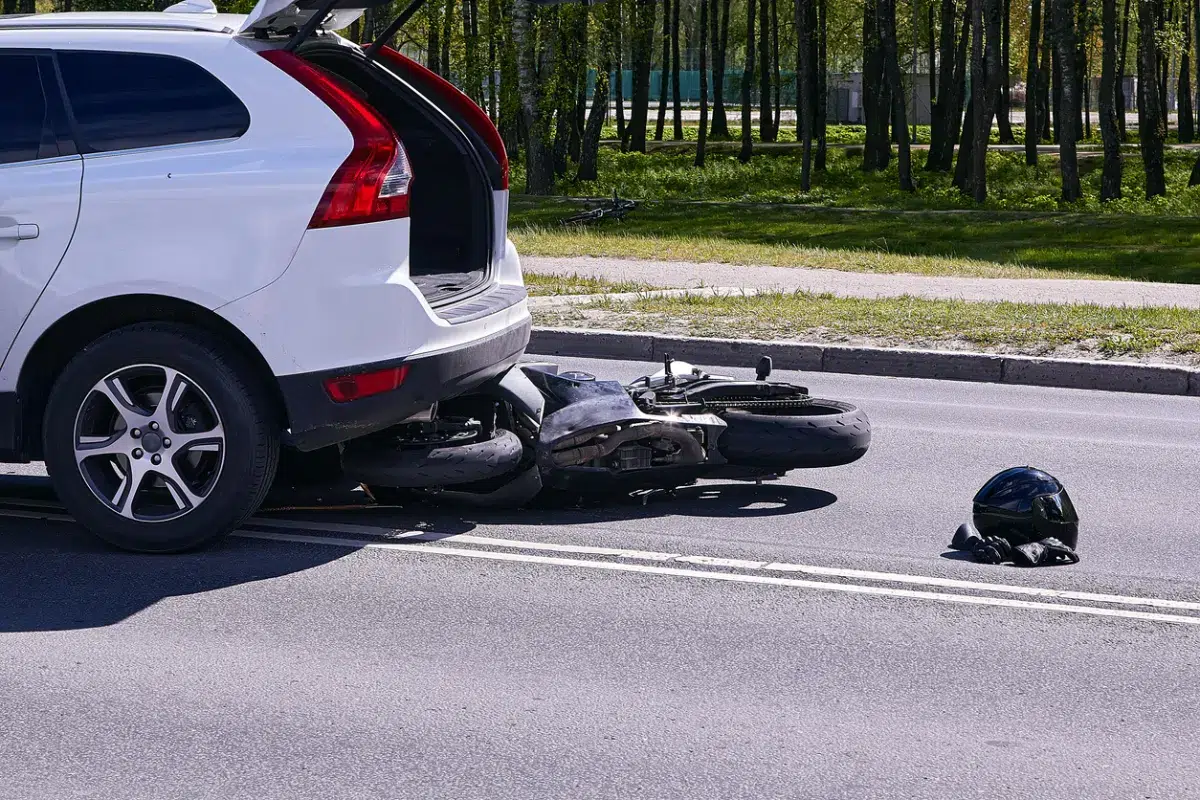
If you’ve been injured in a motorcycle crash, you’re probably wondering what kind of compensation you might be entitled to—and how the settlement process works. Understanding the key factors in average motorcycle accident settlements can help you make informed decisions, maximize your recovery, and avoid common pitfalls that hurt your claim.
At Delfino Green & Green, we specialize in representing motorcycle accident victims across California. We understand the unique challenges motorcyclists face and are committed to helping you navigate every step of the legal process. If you’re exploring your legal options after an accident, our personal injury attorneys are here to help.
Contact us today for a free consultation about your motorcycle accident case.
In this article, we’ll break down the essential motorcycle accident settlement factors, from how claim amounts are calculated to what you can expect during negotiations.
Key Factors Influencing Motorcycle Crash Settlement Amounts
When determining the settlement value for a motorcycle crash claim, several elements come into play. Each factor contributes to the final calculation, and understanding them is essential for any rider seeking compensation. An experienced attorney will meticulously analyze these aspects to build a robust case on your behalf.
1. Severity and Nature of Injuries
This is, without a doubt, the most significant factor affecting motorcycle claim value. Unlike occupants of a passenger car, motorcyclists have very little protection in a collision. This vulnerability often leads to catastrophic injuries, such as:
- Traumatic Brain Injuries (TBIs): Helmets save lives, but they can’t prevent all head injuries. A TBI can lead to lifelong cognitive, physical, and emotional challenges.
- Spinal Cord Injuries: Damage to the spinal cord can result in partial or full paralysis, requiring a lifetime of medical care, assistive devices, and home modifications.
- Road Rash: While the term may sound minor, severe road rash involves deep abrasions that strip away layers of skin, often requiring skin grafts and leaving permanent scarring and nerve damage.
- Fractures and Broken Bones: The force of impact in motorcycle crashes frequently causes multiple, complex fractures that may necessitate surgery, pins, and extensive physical therapy.
- Internal Injuries: Damage to internal organs can be life-threatening and may not be immediately apparent at the accident scene.
The greater the severity of the injury, the higher the associated medical expenses, the longer the recovery period, and the more significant the impact on the victim’s quality of life. All of these elements lead to a higher motorcycle injury compensation payout.
2. Liability and Fault Assessment
To receive compensation, you must prove that another party’s negligence caused your accident. This is the concept of liability. In some states, the rule of “comparative negligence” applies, which means your settlement can be reduced by your percentage of fault. For example, if you are found to be 20% at fault for the accident, your total settlement will be reduced by 20%.
Insurance companies will often try to shift blame onto the motorcyclist, playing on unfair stereotypes that riders are reckless. They might argue you were speeding, lane splitting improperly, or were otherwise careless. An experienced motorcycle accident attorney will counter these tactics by gathering evidence to establish clear liability on the part of the other driver. This includes police reports, witness statements, traffic camera footage, and accident reconstruction expert testimony.
3. Quality of Evidence and Legal Representation
The strength of your claim is built on the evidence you can provide. This includes:
- Medical Records: A complete and detailed record of all your medical treatments, from the initial emergency room visit to ongoing physical therapy and future anticipated surgeries.
- Proof of Lost Wages: Documentation from your employer detailing the time you missed from work and the income you lost as a result. This can also include calculations for loss of future earning capacity if your injuries prevent you from returning to your previous job.
- Photographic and Video Evidence: Pictures of the accident scene, your injuries, and the damage to your motorcycle are powerful tools.
- Expert Testimony: In complex cases, testimony from medical experts, economists, and accident reconstructionists can be invaluable in proving the extent of your damages and establishing fault.
This is where the expertise of a seasoned law firm like Delfino Green & Green becomes indispensable. A skilled legal team knows exactly what evidence to gather and how to present it compellingly to maximize your settlement value for motorcycle crash claims.
4. Legal Representation
Seeking legal representation early in the process is crucial after a motorcycle accident. Having a skilled personal injury attorney or experienced personal injury lawyer can significantly impact the outcome of your case. A knowledgeable lawyer does more than just file paperwork—they conduct in-depth investigations, gather critical evidence like surveillance footage or accident reconstruction reports, consult with medical and economic experts, and build a compelling case to present during negotiations or trial. They can also deal with aggressive insurance adjusters, file motions if necessary, and advise you on whether to accept a settlement or litigate. Personal injury lawyers are dedicated to maximizing your settlement and protecting your interests throughout the claims process.
5. Financial Losses
Accurately tracking your financial losses is essential to receiving a fair motorcycle injury compensation payout. These losses include emergency medical care, surgeries, hospital stays, physical therapy, transportation costs for treatment, and even modifications to your home if your injuries cause long-term disability. You should also document property damage to your motorcycle or other belongings, as this is a key component of your claim. Additionally, lost income extends beyond immediate wages—it may also include lost earning capacity, missed opportunities, future lost wages if your injury prevents a return to your former career, and future medical expenses for ongoing or anticipated treatment related to your injuries.
6. Insurance Policy Limits
The at-fault party’s insurance policy usually sets an upper limit on what you can recover. However, this doesn’t necessarily mean your compensation must stop there. If your damages exceed that policy, your attorney might pursue alternative sources such as umbrella liability policies, third-party liability (e.g., a negligent vehicle manufacturer or government entity responsible for unsafe road conditions), or your own uninsured/underinsured motorist (UM/UIM) coverage. Understanding these additional coverage avenues can make a substantial difference in cases involving high damages.
Liability and Damages in Motorcycle Accident Claims
Liability and damages are the two cornerstones of any personal injury claim, including a motorcycle accident case, which is a specific type of personal injury case. Here’s how they work in motorcycle crashes:
In motorcycle accident cases and other personal injury cases, proving liability involves demonstrating who was at fault for the accident. Calculating damages in these cases requires careful documentation of medical expenses, lost wages, and other losses to ensure fair compensation.
Understanding Liability
Proving the other party’s negligence is essential. You’ll need to demonstrate that the other driver acted carelessly—by speeding, texting, or violating traffic laws—and that this conduct directly caused your injuries. The actions of a motorcycle rider are also closely examined in liability determinations, as motorcycle riders have a duty to follow traffic laws and their compliance or violations can impact the outcome of a claim. If you share fault, your percentage of blame can reduce your payout.
Types of Damages
Once liability is established, the focus shifts to calculating the damages—the monetary value assigned to the harm you have suffered. Damages are typically categorized into two types: economic and non-economic.
- Economic Damages: Medical bills, lost wages, rehabilitation costs, and out-of-pocket expenses.
- Non-Economic Damages: Pain and suffering, emotional distress, and reduced quality of life.
Insurance Coverage Considerations
Motorcycle accident insurance coverage varies widely. Some drivers carry only the minimum coverage, which may not be sufficient to cover your full losses. Understanding both your policy and the at-fault driver’s coverage is crucial.
Insurance companies often use formulas to calculate non-economic damages, such as multiplying the total economic damages by a certain number (a “multiplier”). A skilled lawyer will argue for the highest possible multiplier by effectively communicating the profound, personal impact the accident has had on your life.
Calculating Damages and Average Settlement Amounts
So, how are motorcycle claim amounts calculated?
- Step 1: Add Up Medical Costs. Emergency care, surgeries, physical therapy, medications, and long-term treatment all count. Keep detailed records of every expense, as these will directly impact your settlement amount in a motorcycle accident claim.
- Step 2: Include Lost Income. If your injuries forced you to miss work or will prevent you from returning to your job, those wages are compensable and factor into the final settlement amount.
- Step 3: Factor in Non-Economic Losses. Pain and suffering are more subjective but just as important. Insurance companies often use multipliers based on your economic damages to estimate these losses, which can significantly affect the final settlement.
So, how do all these factors combine to create a settlement offer? There is no single formula, and every case is unique. However, a personal injury lawyer will typically calculate a potential settlement amount by adding the total economic damages to a carefully reasoned valuation of the non-economic damages. The goal is always to secure the maximum settlement for clients, ensuring that the final settlement amount reflects the true extent of your losses.
While it’s impossible to state a precise figure without reviewing a specific case, the average motorcycle accident settlement can range widely. Motorcycle accident results and motorcycle crash settlements vary based on the severity of injuries, liability, and insurance coverage.
- Minor to Moderate Injuries: Cases involving injuries like less severe fractures or road rash, with a full recovery expected, might see settlements in the range of $20,000 to $75,000.
- Serious Injuries: For crashes resulting in non-catastrophic but serious harm, such as a herniated disc or a more complex fracture requiring surgery, settlements can often be $100,000 to $250,000 or more.
- Catastrophic Injuries: When an accident causes life-altering injuries like a TBI or paralysis, the settlement value for the motorcycle crash claim will be significantly higher, often reaching into the high six-figures or millions of dollars to account for a lifetime of care.
Negotiating a fair settlement is a critical part of the process. Your attorney will work to reach a final settlement that accurately reflects your damages and resists insurance company tactics to minimize your compensation. The final settlement amount is determined by factors such as injury severity, insurance limits, and the specifics of your motorcycle accident claim.
It’s crucial to remember that these are just general ranges. The at-fault party’s insurance coverage and policy limits will also play a major role in the final settlement. If the responsible driver has only minimum liability coverage, it may not be enough to cover all your damages. In such situations, an attorney can explore other avenues for recovery, such as your underinsured motorist (UIM) coverage. For those pursuing a California motorcycle accident settlement, state-specific laws and insurance requirements can further influence the settlement amount and the overall outcome of motorcycle crash settlements.
Maximizing Your Settlement for a Motorcycle Accident Lawsuit
The bike accident settlement process can feel overwhelming, but there are concrete steps you can take to protect your claim and work toward a fair outcome.
- Seek Immediate Medical Attention: Your health is the top priority. Seeing a doctor immediately after a crash not only ensures you get the care you need but also creates a medical record that links your injuries directly to the accident.
- Document Everything: Keep a detailed file of all your medical bills, receipts for out-of-pocket expenses, and records of your lost wages. It’s also helpful to keep a personal journal detailing your pain levels, physical limitations, and the emotional impact of the accident.
- Do Not Give a Recorded Statement to the Other Insurer: The at-fault party’s insurance adjuster will likely contact you quickly. They are trained to ask questions designed to get you to say something that minimizes your injuries or implies you were at fault. Politely decline to provide a statement until you have spoken with an attorney.
- Avoid Quick Settlement Offers: Insurance companies often make a lowball offer early in the process, hoping you’ll accept it out of desperation before you understand the full extent of your damages. Accepting this offer means you forfeit your right to seek further compensation. Never accept an offer without having it reviewed by a qualified lawyer.
- Consult with an Experienced Motorcycle Accident Lawyer: This is the single most important step you can take. An attorney will handle all communications with the insurance companies, manage the complex legal and administrative work, and build the strongest possible case to maximize your settlement.
Car Accident Comparisons
While both are vehicle accidents, motorcycle crashes differ from car accidents in key ways that influence the settlement process.
- Severity of Injuries: Motorcyclists have far less protection, which typically results in more severe injuries and, therefore, higher potential settlements.
- Perceptions of Risk: Juries and insurance companies may view motorcyclists as risk-takers, which can bias outcomes. Strong legal representation helps counteract these assumptions.
- Claim Complexity: Motorcycle crashes often involve more complicated liability disputes and require specialized legal knowledge.
Wrongful Death and Motorcycle Accidents
Tragically, some motorcycle accidents are fatal. When this happens, the victim’s surviving family members may be able to file a wrongful death claim. This type of lawsuit seeks compensation for the losses the family has suffered due to their loved one’s death. Damages in a wrongful death claim can include:
- Funeral and burial costs
- Loss of financial support
- Loss of companionship and consortium
- Emotional pain and suffering
Why Legal Representation Matters
Wrongful death claims are emotionally difficult and legally complex. A compassionate, experienced attorney can guide you through the process and advocate for the full compensation your family deserves.
Final Thoughts: Know Your Rights, Protect Your Claim
Navigating the aftermath of a motorcycle crash is not a journey you should take alone. The factors affecting motorcycle claim value are numerous and complex, and insurance companies have teams of adjusters and lawyers dedicated to protecting their bottom line by minimizing your payout.
By partnering with the experienced motorcycle accident lawyers at Delfino Green & Green, you level the playing field. We understand the nuances of these cases, from proving liability and countering rider bias to accurately calculating the full, lifetime cost of your injuries. We will handle the legal burdens, allowing you to focus on what matters most: your recovery.
If you’ve been injured in a motorcycle crash, don’t try to navigate this alone. Reach out to the experienced team at Delfino Green & Green today for a free, no-obligation consultation to discuss your case and learn how we can help you pursue justice.
Disclaimer: This content is for informational purposes only and does not constitute legal advice. For personalized legal assistance, please contact Delfino Green & Green directly.



